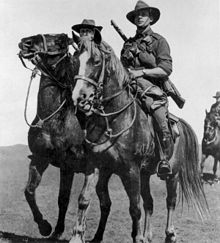waler
Appearance
English
[edit]
Etymology 1
[edit]From (New South) Wale(s) + -er, the horse having been bred in the then colony of New South Wales in the 19th century.
Pronunciation
[edit]Noun
[edit]waler (plural walers)
- (Australia, India) A breed of light saddle horse from Australia, once favoured as a warhorse.
- 1888, Rudyard Kipling, “Wressley of the Foreign Office”, in Plain Tales from the Hills, Folio Society, published 2004, page 204:
- Without reason, against prudence, and at a moment's notice, he fell in love with a frivolous, golden-haired girl who used to tear about Simla Mall on a high, rough waler, with a blue velvet jockey-cap crammed over her eyes.
- 1889, Annie Brassey, The Last Voyage, to India and Australia, in the ‘Sunbeam’, published 2010, page 46:
- There were Arabs of high degree, thoroughbred English horses, and very good-looking Walers among them, besides some tiny ponies, four of which, when harnessed together, drew a real Cinderella coach of solid silver.
- 2007, "Waler", entry in Bonnie L. Hendricks, International Encyclopedia of Horse Breeds, page 434,
- Some maintain that the Waler is extinct, its blood living on only in the modern Australian Stock Horse and some of the feral brumbies that roam the outback.
- 2013, Peter Macinnis, The Big Book of Australian History, page 134:
- By the 1850s, there was a thriving trade in selling the horses to the Indian Army as 'remounts'. Between 1834 and 1937, more than 300,000 Walers were sent to India.
Usage notes
[edit]Formerly considered a horse type, rather than a distinct breed.
Etymology 2
[edit](This etymology is missing or incomplete. Please add to it, or discuss it at the Etymology scriptorium.)
Pronunciation
[edit]Noun
[edit]waler (plural walers)
- (structural engineering) A plank of wood, block of concrete, etc., used for support or to maintain required separation between components in order to help maintain the form of a construction under stress.
- 1998, Richard Lampo, Thomas Nosker, Doug Barno, John Busel, Ali Maher, Piyush Dutta, Robert Odello, Construction Productivity Advancement Research (CPAR) Program: Development and Demonstration of Composite FRP Fender, Loadbearing, and Sheet Piling Systems, US Army Corps of Engineers Construction Engineering Research Laboratories, USACERL Technical Report 98/123, page 65,
- Another consideration is when walers are placed between the piles (Figure 27) and to what extent the pile could deform before the load of the berthing vessel would be shared by the adjacent walers.
- 2007, David Easton, The Rammed Earth House, page 121:
- Backing for the plywood is provided by 2” × 12” wooden planks (walers in forming technology) spaced approximately 15 inches apart in the vertical direction and running the full length of the wall section. The form ties are ¾-inch pipe clamps, spaced 6 to 10 feet apart in the horizontal direction. In the typical concrete forms, walers are 2×4's and form ties are spaced at 2-foot intervals. By using 2×12 walers, form ties can be spaced at up to 10-foot intervals.
- 2009, Howard A. Perko, Helical Piles: A Practical Guide to Design and Installation, page 374:
- An optional cast-in-place concrete waler is shown at each anchor row location. The concrete walers are cast against the earth after installation of the helical anchors and prior to excavation for the next lift. Concrete walers can reduce the required thickness of shotcrete for the remaining facing. The walers also improve punching resistance at the helical tie back locations.
- 1998, Richard Lampo, Thomas Nosker, Doug Barno, John Busel, Ali Maher, Piyush Dutta, Robert Odello, Construction Productivity Advancement Research (CPAR) Program: Development and Demonstration of Composite FRP Fender, Loadbearing, and Sheet Piling Systems, US Army Corps of Engineers Construction Engineering Research Laboratories, USACERL Technical Report 98/123, page 65,

